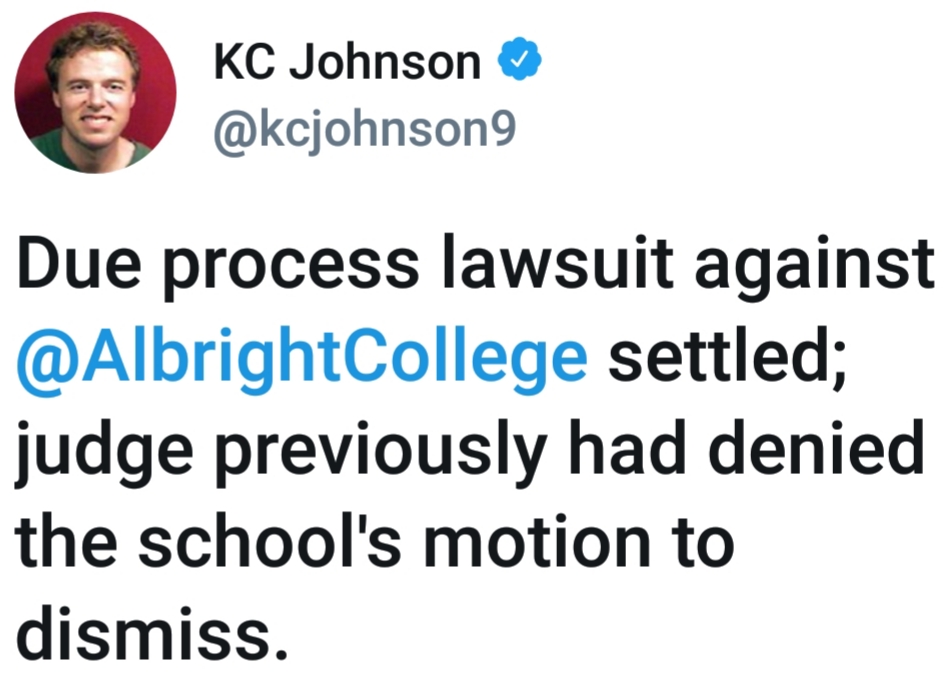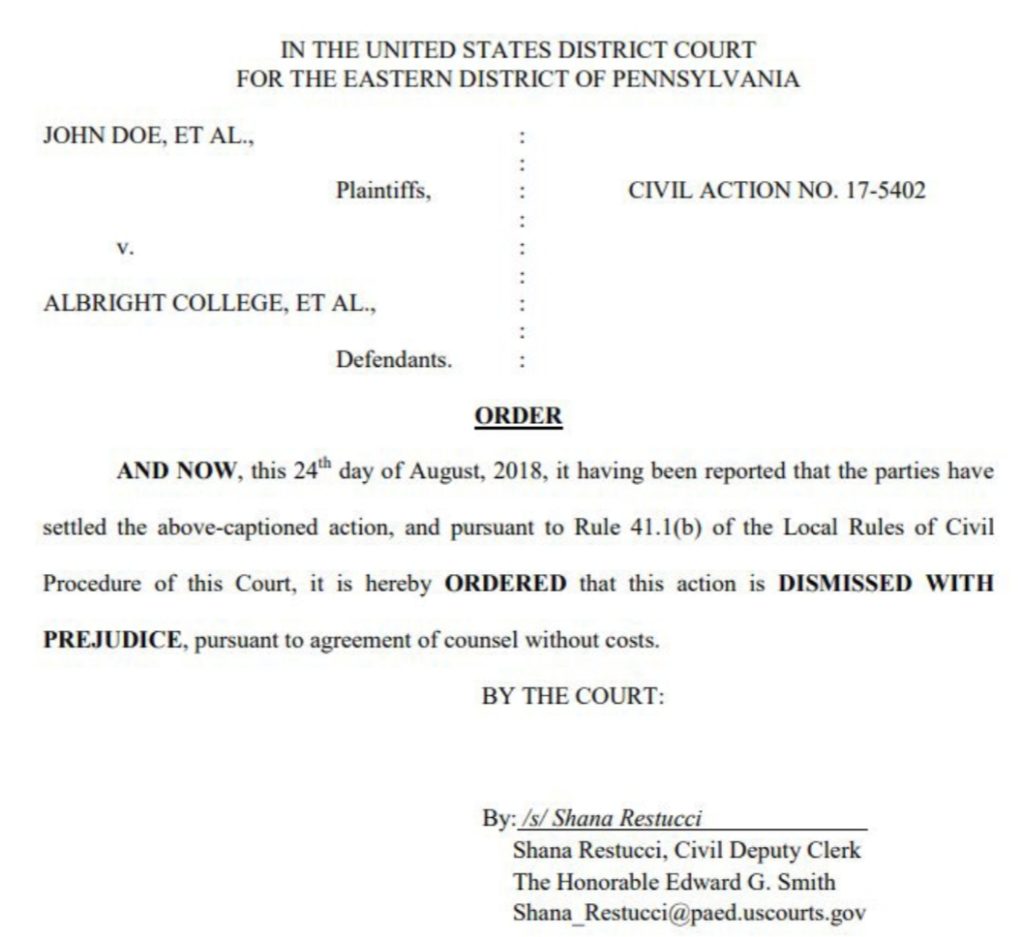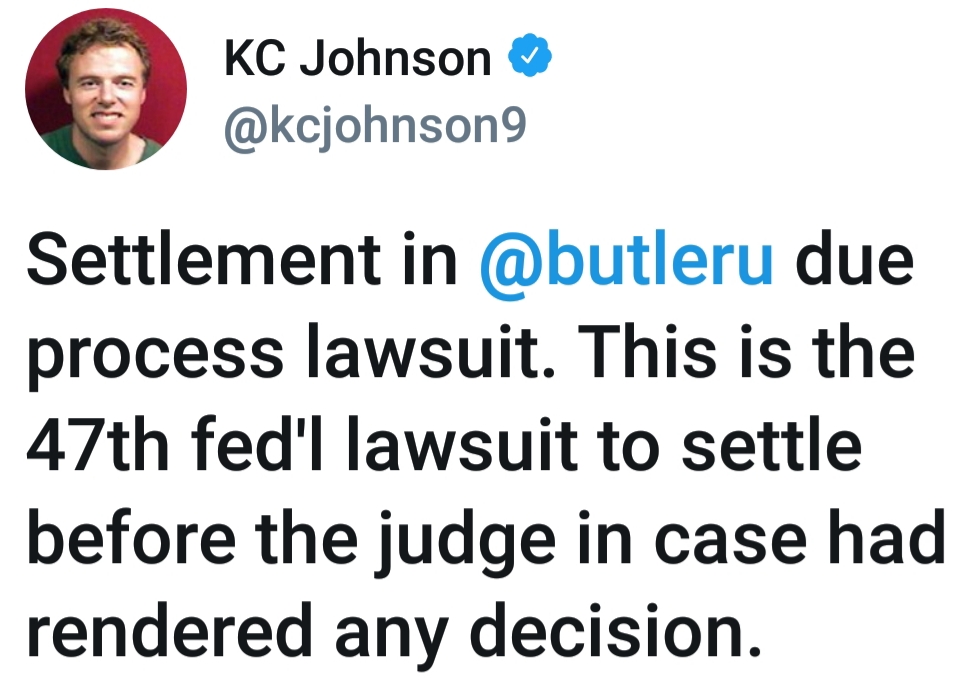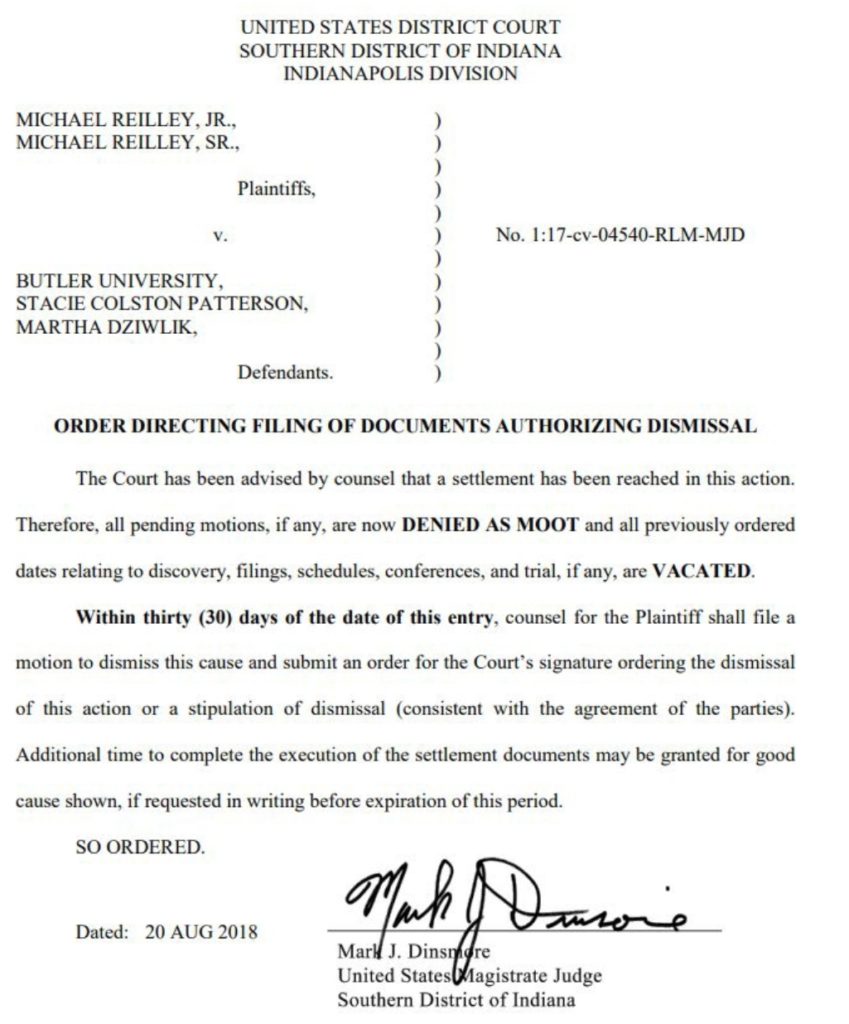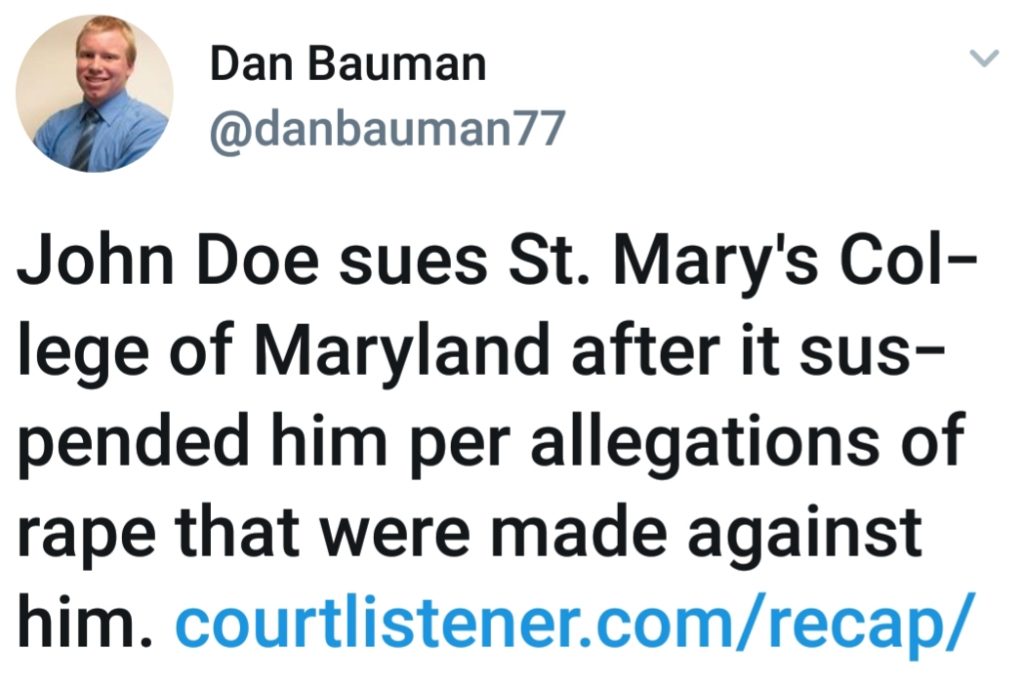
CURRENT News


COURT Rulings & Settlements, CURRENT News, DUE Process Rights, GOOD News, Case Dismissed, MUST Reads /
DUE PROCESS Legal Update: UC Santa Barbara Found in Contempt of Court
In a remarkable step, a judge in the Santa Barbara County Superior Court has found the University of California, Santa Barbara in contempt of court for failing to comply with a court decision regarding the rights of an accused student in a campus sexual misconduct proceeding. As is all too common in these cases, UCSB rendered its decision without granting Doe a hearing or an opportunity to confront his accuser… Finding that UCSB had not complied with its own policies, Judge Geck ordered UCSB to reinstate Doe and to reconsider his appeal using not only the investigator’s report, but all the evidence presented at the appeal hearing. In February 2018, the appeals panel convened again to reconsider its decision in Doe’s case. The panel once again rejected Doe’s appeal and dismissed him from the university. The revised appeal decision included introductory language stating that the panel had now considered all the evidence from the appeal hearing. But the actual decision itself was “identical in every respect to the original Appeal Decision,” according to an August 2018 court order finding UCSB in contempt of the court’s December 2017 ruling. According to the court, the new language indicated “that the panel did not genuinely reconsider the case, but simply added language that would make the original decision look like a truly reconsidered decision.” This time around, Judge Geck made clear that she did not trust the appeals panel to once again reconsider Doe’s case, since that panel “does not appear to be inclined” to “independently review the evidence” and make its own decision. As a result, she ordered UCSB to vacate entirely the finding of responsibility against Doe and to re-admit him as a student effective Fall 2018.
thefire.org By Samantha Harris UCSB dailynexus.UC Regents Found in Contempt


CURRENT News, DoED, TitleIX, OCR, DUE Process Rights /
COMMON APP No Longer Asks Your Criminal History. But Will Ask About Anti-Due Process TIX Disciplinary History
The Common Application decided to “ban the box” starting next year — so the million-plus students who use the online form to apply to some 800 colleges nationwide won’t have to disclose whether they have ever been convicted of a crime. But something was missing from the ‘ban the box’ debate: The question that the Common App is leaving on the application. All schools will still learn whether an applicant has ever been previously disciplined by another school — including, but not limited to, expulsion, suspension and probation. Some of these cases center on allegations of sexual misconduct and get decided behind closed doors on a far lower standard of proof than the high bar required for conviction in criminal court. Think about that. The people who run the Common App are saying they don’t think it’s appropriate to ask about your criminal history — when you have had all of the rights of a criminal defendant, including the right to cross-examination, the power to subpoena evidence and witnesses in your favor and the presumption of innocence unless guilt is proved beyond a reasonable doubt. But they do think it’s important to ask whether some other school, without giving you any of those rights, has found you responsible for something based on a mere preponderance of the evidence. This makes no sense. If bad things that people are accused of doing in the past shouldn’t be relevant to a school’s evaluation of that student, then shouldn’t that apply with even more force when that finding is made without any due process rights and with the lowest burden of proof used to find facts in law?
washingtonpost.com By Justin Dillon, Scott Bernstein

CURRENT News, DoED, TitleIX, OCR, DUE Process Rights, MUST Reads /
IS THE Dept. of Justice Creating a Campus Title IX Sex Offender Registry?
The Department of Justice (DOJ) is seeking to collect information from colleges and universities regarding their policies and practices for sexual misconduct…one could think it is looking to create a campus sex offender registry. “This project will collect information about current policies and practices utilized by colleges and universities regarding registered sex offenders who may be students or employees; individuals found responsible and sanctioned for campus sexual misconduct policy violations; and the review of criminal or disciplinary sexual misconduct history of prospective or current students,” the notice states. The DoJ is taking comments to its proposal to become embroiled in campus Title IX adjudications through August 31st. Comments can be sent to:
samantha.Opong@usdoj.gov
submissions@omb.eop.govThis is a bad idea now, and offers enormous, and entirely unjustifiable, potential for abuse in the future. The time to fix problems is before they happen, even if the government swears it would never, but never, do anything bad with the information it gathers.
simplejustice.us By Greenfield dailywire.com By Schow

COURT Rulings & Settlements, CURRENT News, FALSE Accusers & Stats /
FALSE ACCUSER Nikki Yovino, Sentenced to One Year in Jail. She ‘Just Doesn’t Seem to Get it.’
The 19-year-old Long Island woman — who claimed she was raped by two Sacred Heart University football players, then admitted months later to police that she lied to impress a prospective boyfriend, then claimed on the witness stand she was forced to have sex without her consent. Until finally she pleaded guilty to criminal charges, admitting her deceit to a judge — stood handcuffed Thursday morning, rolling her eyes as one of the now former players poured out his heart in court. “I went from being a college student to sitting at home being expelled with no way to clear my name,” Malik St. Hilaire said in a Bridgeport courtroom as he stood near Yovino, “I just hope she knows what she has done to me, my life will never be the same. I did nothing wrong, but everything has been altered because of this.” A statement was read for the other falsely accused student, “The last almost two years have been definitely my most difficult of my life- The roller coaster of emotions; fear, anger, sadness, embarrassment, depression, anxiety and the list goes on. She accused me of what I believe to be a horrendous, horrific crime out of her own selfish concerns.“I lost my scholarship, my dream of continuing to play football and now I am in debt $30,000 and I’m simply trying to get ahead as best as I can.” False accusations happen. False accusations ruin lives.
simplejustice.us By Greenfield thehour.com By Tepfer
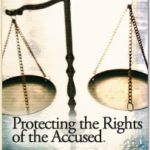
COURT Rulings & Settlements, CURRENT News /
JUDGE RULES: GWU Broke Contract w Accused Male by Judging him a Rapist
A judge has ru
led George Washington University broke its contract with a student after he was accused of sexual assault and denied a chance to appeal even though he had evidence that directly contradicted the accuser’s claim. John Doe proclaimed his innocence and said that his accuser never made a phone call she claimed to have made — a phone call the school determined proved she had been too drunk to consent to sex. U.S. District Court Judge Rosemary M. Collyer agreed that this evidence — and expert testimony from a toxicologist – should have been enough to grant John an appeal. Judge Collyer sided with John Doe, ruling that the university was in breach of its own rules by refusing to hear his appeal of its finding against him. The university protested the student’s description of its code as a “contract,” saying that it “did not intend to be bound by the Code and that there is no mutuality of obligation.” It’s the second recent court ruling to find that a university ignored its own contract with a disciplined party. Last month the Wisconsin Supreme Court ordered Marquette University to reinstate a tenured conservative professor it had functionally fired for publicly criticizing a socially liberal colleague by name… John Doe sued GW on multiple claims, including breach of contract. GW argued that while John was re
quired to follow the university’s code of conduct, it had no obligation to do so in return, something Judge Collyer didn’t buy. Collyer had earlier refused to order GWU to clear Doe’s record and give him his degree, saying he hadn’t suffered “irreparable harm,” but the judge also found that Doe was “likely to succeed on the merits” of his appeal claim.
dailywire.com By Schow thecollegefix.com By Piper

BLOG, Personal Stories, CURRENT News, DUE Process Rights, MUST Reads /
TO ATHLETIC COACHES: Lawyers Say Contract Sexual Misconduct Clauses Are Concerning
The scandal embroiling head football coach Urban Meyer at The Ohio State University took on a concerning new dimension recently, when media coverage revealed that last April, Ohio State added language to Meyer’s contract requiring him to report any known violations of the school’s sexual misconduct policy. The clause Ohio State inserted into Urban Meyer’s contract when it gave him an extension and $1.2 million raise in April required him to “promptly report to Ohio State’s Title IX coordinator for athletics any known violations of Ohio State’s sexual misconduct policy.” That now appears prescient — the school is currently investigating Meyer’s failure to report domestic abuse allegations against one of his assistant coaches. If Meyer breached that clause, the university may not have to pay the $38.1 million it would owe him if it fired him without cause. Ohio State isn’t the only school that has added this sort of clause to coaching contracts. So has Texas A&M. This trend is seemingly a reaction to the sexual assault scandal at Baylor University. No school wants to be the next Baylor. And some schools apparently believe that these new clauses are a way to avoid that fate. As attorneys who have represented scores of students nationwide in sexual misconduct investigations, however, we are concerned that these clauses will do a lot more harm than good, by turning innocent college students into alleged perpetrators of sexual misconduct. That’s because there’s a wide gap between how schools define “sexual misconduct” and what people typically consider “sexual misconduct.” Schools, to the surprise of no one except people who work at schools, sometimes don’t have a lot of common sense. But when schools deputize coaches to report on their players — or face termination without severance — there will be a lot more of these sorts of cases: technical violations of an overly broad policy that ordinarily wouldn’t turn into a full-fledged sexual misconduct investigation. The problem isn’t the noble motivation of these new clauses — it’s that schools define “sexual assault” and other forms of “sexual misconduct” too broadly. Law360 -Coach Contract Op-Ed By Bernstein and Dillon

BLOG, Personal Stories, CURRENT News, DoED, TitleIX, OCR, GOOD News, Case Dismissed, MUST Reads /
A VIOLENT DANCE: The True Story of Grant Neal, A Documentary.
Many people probably remember reading about Grant Neal. He was a very promising student-athlete at CSU-Pueblo, but had his dreams crushed when his university falsely accused him of rape. Grant’s girlfriend never accused Grant, and never said she was assaulted, but a third party saw a hickey on the neck of his consenting girlfriend, and reported Grant to TitleIX as an abuser. After a college kangaroo hearing process, Grant was expelled in 2015…But now it’s 2018 and it appears that through Grant’s strength, stamina, and perseverance, he pushed past his unjust persecutions, and is achieved success with a different dream. SOS was so happy to hear about an upcoming documentary on Grant Neal’s true story.
“When we first met with Grant to discuss his story and the plan of turning it into a documentary, he was hesitant. In addition to the technical challenges of filmmaking, Grant’s narrative was very sensitive and we’d have to navigate our way around legal obstacles in order to have an open dialogue about his Title IX case. Regardless of the challenges, we were all determined to make this film and just a week after our first meeting, we received full legal clearance and kicked-off production.” Filmmaker Magellan Rubin

CURRENT News, DUE Process Rights, TITLE IX Lawsuits /
JOHN DOE Sues St. Mary’s College of Maryland. It’s a ‘Quasi-Judicial System-Violates own Policy’
According to the lawsuit, neither John Doe or Jane Roe were intoxicated during their interactions and Jane did not stay the night at John’s place. The two left together after their intimate encounter. But four months later, on January 22, 2018, John Doe was visited by Campus Police who hand delivered a document entitled Notice of Investigation. Prior to this visit John was completely unaware of any complaint or any College administrative investigation concerning him. The College’s Procedures require the Title IX Coordinator and the Investigator to be separate persons, but Michael Dunn disregarded that and served in the roles of TitleIX Coordinator, investigator, and judge and jury in a clear violation of the College’s Procedures…Throughout the disciplinary process, the College treated John unfairly because of his sex, including, among other things, by failing to give him basic due process protections such as the right to confront his accuser, to receive copies of relevant evidence, and to present witnesses and other evidence on his own behalf; and by conducting an inadequate, unreliable, and biased investigation of the complaint against him. ‘The facts of this matter, and the actions of the Defendant in this matter, are evidence of administrative quasi-judicial system at a public college, so poorly conceived and illegally administered, and so grievously flawed that it rises to the level of a blatant, systemic and actionable violation of the Plaintiff’s civil rights.’
